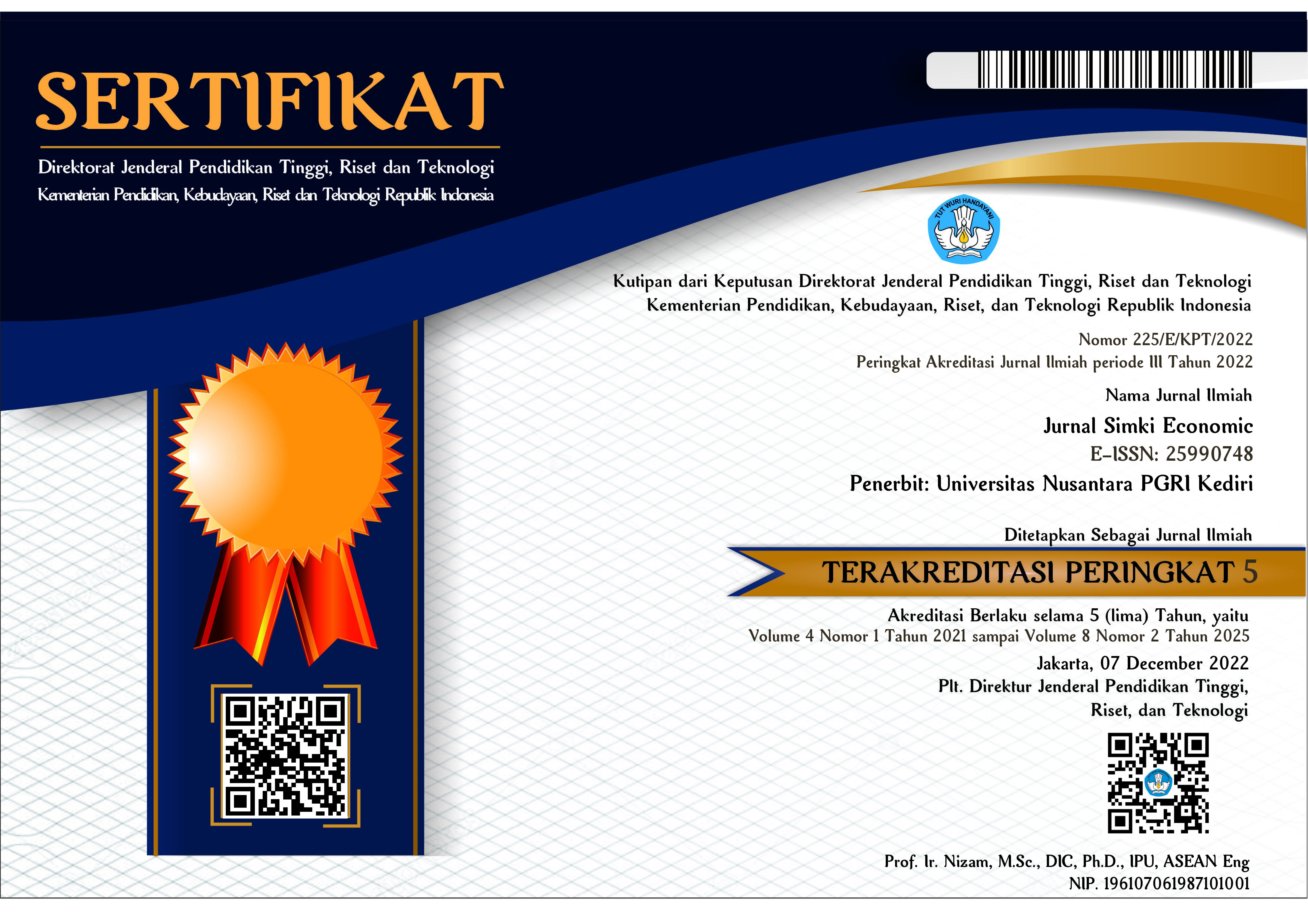Perilaku Keuangan Generasi Z Berdasarkan Literasi Keuangan, Efikasi Diri, dan Gender
Studi Kasus Mahasiswa Perguruan Tinggi di Kota Jember
 Abstract views: 981
,
Abstract views: 981
,
 PDF (Bahasa Indonesia) downloads: 405
PDF (Bahasa Indonesia) downloads: 405
Abstract
A widely discussed topic today is financial behavior, especially the tendency for someone to think short-term and make impulsive purchases. This often causes financial problems, even for someone with adequate income, due to being less responsible in managing their finances. This study was conducted to evaluate the effect of financial literacy, self-efficacy, and gender differences on individual financial behavior in the Generation Z group, especially students of Jember City Colleges. This study uses a quantitative method with data collection techniques through questionnaires. The number of samples used was 398 respondents, selected using a purposive sampling technique. To analyze the relationship between the variables in this study, a multiple linear regression technique was used. The results of the multiple linear regression analysis showed that the three variables had a positive and significant effect on financial behavior. Financial literacy has a positive effect of 1.022, self-efficacy of 0.109, gender of 0.199 with a sig value of all variables of 0.00 or <0.05. The results of the analysis show that financial literacy, self-efficacy, and gender contribute to the financial behavior of students of Colleges in Jember City.
Downloads
References
Akbar, R. P., & Armansyah, R. F. (2023). Perilaku Keuangan Generasi Z Berdasarkan Literasi, efikasi diri, dan gender. Jurnal Ilmiah Manajemen Dan Bisnis, 2(2), 107–124. https://doi.org/10.24034/jimbis.v2i2.5836
Arianti, B. F. (2020). Pengaruh Pendapatan Dan Perilaku Keuangan Terhadap Literasi Keuangan Melalui Keputusan Berinvestasi Sebagai Variabel Intervening. Jurnal Akuntansi, 10(1), 13–36. https://doi.org/10.33369/j.akuntansi.10.1.13-36
Conner, M. (2020). Theory of Planned Behavior. Handbook of Sport Psychology, 1–18. https://doi.org/10.1002/9781119568124.ch1
Eka Puspita Sari, A. S. (2021). The Role of Financial Literacy as One of the Influences of Financial Behavior. Jurnal Manajemen, 25(3), 415. https://doi.org/10.24912/jm.v25i3.758
Haqiqi, A. F. Z., & Pertiwi, T. K. (2022). Pengaruh Financial Technology, Literasi Keuangan dan Sikap Keuangan terhadap Perilaku Keuangan Generasi Z di Era Pandemi Covid-19 pada Mahasiswa UPN “Veteran” Jawa Timur. SEIKO : Journal of Management & Business,5(2),355367. https://doi.org/10.37531/sejaman.v5i2.2301
Herawati, N. T., Candiasa, I. M., Yadnyana, I. K., & Suharsono, N. (2018). Factors That Influence Financial Behavior Among Accounting Students in Bali. International Journal of Business Administration, 9(3), 30. https://doi.org/10.5430/ijba.v9n3p30
Humaidi, A., Khoirudin, M., Adinda, A. R., & Kautsar, A. (2020). The Effect of Financial Technology, Demography, and Financial Literacy on Financial Management Behavior of Productive Age in Surabaya, Indonesia. International Journal of Advances in Scientific Research and Engineering, 06(01), 77–81. https://doi.org/10.31695/ijasre.2020.33604
Lestari, A. E., Indriani, E., & Kartikasari, N. (2022). Pengaruh Literasi Keuangan, Return, Persepsi Risiko, Gender Dan Kemajuan Teknologi Terhadap Minat Investasi Mahasiswa. JurnalRiset Mahasiswa Akuntansi, 2(4), 726–738. https://doi.org/10.29303/risma.v2i4.238
Mawaddah, H. (2021). Analisis Efikasi Diri pada Mahasiswa Psikologi Unimal. Jurnal Psikologi Terapan (JPT), 2(2), 19. https://doi.org/10.29103/jpt.v2i2.3633
Nababan, D., & Sadalia, I. (2014). Analisis Personal Financial Literacy dan Financial Behavior Mahasiswa Strata I Fakultas Ekonomi Universitas Sumatera Utara. Jurnal Ekonomi Media Informasi Manajemen, 1(1), 1–16. https://repositori.usu.ac.id/handle/123456789/71553
Nurul, A. (2020). Pengaruh Literasi Keuangan, Gaya Hidup Pada Perilaku Keuangan Pada Generasi Milenial. Competition for California Water: Alternative Resolutions, 01, 113–135. https://doi.org/10.1558/ecotheology.v9i1.124
Pradita, R. I. (2021). Pengaruh Literasi Keuangan, Kepribadian Dan Perbedaangender Terhadap Perencanaan Keuangan Keluarga Di Politeknik Pelayaran Surabaya. BAJ (Behavioral Accounting Journal), 4(2), 372–388. https://doi.org/10.33005/baj.v4i2.155
Ritakumalasari, N., & Susanti, A. (2021). Literasi Keuangan, Gaya Hidup, Locus of Control, dan Parental Income terhadap Perilaku Keuangan Mahasiswa. Jurnal Ilmu Manajemen, 9(4), 1440–1450. https://doi.org/10.26740/jim.v9n4.p1440-1450
Rohmanto Fajar, S. A. (2021). Pengaruh Literasi Keuangan, Lifestyle Hedonis, dan Sikap Keuangan Pribadi Terhadap Perilaku Keuangan Mahasiswa. ECOBISMA (Jurnal Ekonomi, Bisnis Dan Manajemen), 9(1), 40–48. https://doi.org/10.37858/publisitas.v9i1.156
Safryani, U., Aziz, A., & Triwahyuningtyas, N. (2020). Analisis Literasi Keuangan, Perilaku Keuangan, Dan Pendapatan Terhadap Keputusan Investasi. Jurnal Ilmiah Akuntansi Kesatuan, 8(3), 319–332. https://doi.org/10.37641/jiakes.v8i3.384
Salsabila, N. P., Basalamah, M. R., & Rahmawati. (2023). Pengaruh Financial Technology, Literasi Keuangan Dan Gender Terhadap Perilaku Keuangan Pada Mahasiswa Fakultas Ekonomi Dan Bisnis Universitas Islam Malang. E – Jurnal Riset Manajemen, Vol. 12 No(02), 1025–1033. https://jim.unisma.ac.id/index.php/jrm/article/view/20072
Samsurijal, H. (2022). Manajemen Keuangan (Fachrurazi (ed.)).
Sari, N. (2021). Pengaruh Financial Literacy, Locus of Control, Life Style, dan Gender terhadap Financial Management Behavior Mahasiswa Universitas Negeri Surabaya. Jurnal Ilmu Manajemen, 9(2), 670. https://doi.org/10.26740/jim.v9n2.p670-680
Septriani, Y., Suzanna, L. ., & Mustika, R. (2022). Pengaruh Literasi Keuangan, Gender Dan Gaya Hidup Terhadap Perilaku Pengelolaan Keuangan Mahasiswa. Accounting Information System, Taxes and Auditing Journal (AISTA Journal), 1(2), 173–183. https://doi.org/10.30630/aista.v1i2.24
Sianipar, B. A., Purnamasari, E. D., & Ulum, M. B. (2023). Pengaruh Literasi Keuangan dan Lifestyle Hedon Terhadap Perilaku Keuangan Gen-Z pada Mahasiswa Prodi Manajemen Angkatan 2020 Universitas Indo Global Mandiri Palembang. Ekono Insentif, 17(2), 84–95. https://doi.org/10.36787/jei.v17i2.1167
Sugiyono, D. (2016). Metode penelitian kuantitatif kualitatif dan R&D. In Penerbit Alfabeta (Issue January).
Teguh Pambudi, Y., Widorotama, A., Syakur Fahri, A., & Miftakhul Farkhan, M. (2022). Korelasi Efikasi Diri dan Motivasi Belajar dengan Hasil Belajar Mahasiswa Pendidikan Jasmani. Jurnal Porkes, 5(1), 158–167. https://doi.org/10.29408/porkes.v5i1.5350
Wanda Ayu Rasari, & Endang Wulandari. (2024). Pengaruh Literasi Keuangan Dan Pendapatan Terhadap Keputusan Investasi Mahasiswa. Seminar Nasional Pariwisata Dan Kewirausahaan (SNPK), 3, 594–601. https://doi.org/10.36441/snpk.vol3.2024.277
Wardani, N. P. I. S., Suryani, E., & Nugraha, I. N. (2022). Financial Literacy , Self Efficacy , dan Self Esteem Terhadap Perilaku Manajemen Keuangan Pada Pelaku UMKM Dengan Gender Sebagai Variabel Moderasi. JPIn: Jurnal Pendidik Indonesia, 5(2), 129–146. https://doi.org/10.47165/jpin.v5i2.343
Yap, R. J. C., Komalasari, F., & Hadiansah, I. (2018). The Effect of Financial Literacy and Attitude on Financial Management Behavior and Satisfaction. Bisnis & Birokrasi Journal, 23(3), 3–5. https://doi.org/10.20476/jbb.v23i3.9175
Yunita, N. (2020). Pengaruh Gender Dan Kemampuan Akademis TerhadapLiterasi Keuangan Dalam Perilaku Pengelolaan Keuangan Pada Mahasiswa Jurusan Akuntansi. Program Studi Akutansi, 01(02), 1–12. https://ojs.stiesa.ac.id/index.php/prisma/article/view/414
Copyright (c) 2025 Efiatul Himmah, Retno Endah Supeni, Maheni Ika Sari

This work is licensed under a Creative Commons Attribution 4.0 International License.














